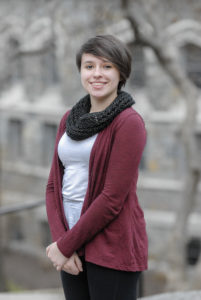
Anna Simoneau
Campus police are dealt an unfortunate situation to begin with.
It’s not the police’s fault the drinking age is 21 not 18, but since it’s their job to enforce the law, the blame and resentment usually fall to its officers. Especially now, in light of recent incidents in which multiple Lehigh students were hospitalized from alcohol-related incidents, alcohol safety is of the utmost importance.
However, I find some of the ways the Lehigh University Police Department operates in these situations go too far. Specifically, LUPD’s possession of a police dog and a surveillance drone go beyond what is necessary to police students. They can even infringe on students’ rights, which further sours the relationship between students and LUPD.
In both cases, the sheer ownership of these resources by the LUPD criminalizes students even before they are used.
Surveillance drones are used by police to actively look for crime, and the fact that LUPD feels the need to use such a severe device means it thinks students are committing crimes and need to be surveilled. It is understandably upsetting to students because they are made uncomfortable by the drone.
With similarly invasive intentions, police dogs are typically used for bomb sniffing and drug location. Since Lehigh rarely has credible bomb threats, the new dog’s main purpose will most likely be locating drugs. Owning a drug-sniffing dog implies LUPD either thinks or is assuming a significant portion of Lehigh is doing drugs to merit this measure, again criminalizing students.
In the case of the drone, students’ privacy rights could easily be violated. According to the Federal Aviation Administration, drones cannot be flown higher than 400 feet. However, students are technically entitled to a certain airspace over their property. While the U.S. Supreme Court has not made an official ruling, between 83 and 500 feet can be considered a height wherein residents can expect their airspace clear based on prior rulings. If the drone flies within this zone, a resident could form a case for invasion of privacy.
Beyond the possible violation of privacy rights, the drone is simply an unnecessary expenditure. If it were to fly in legal airspace at 400 feet, it would be restricted to public sidewalks and roads, where police cruisers already patrol.
If LUPD’s goal is to shut down parties, it doesn’t need a drone. It’s incredibly easy to tell which houses are hosting parties from the music and noise. These observations or noise complaints from other residents can give LUPD probable cause to shut down parties without the use of the drone.
Like the drone, having a police dog also infringes on students’ rights. If there was some form of complaint about drugs and the police dog was brought in, that would fall under probable cause and be perfectly fine. However, I don’t think any of us want to live in an Orwellian Lehigh where a police dog patrols the dorms. That takes it too far.
Since the police dog is still in training, we don’t know how LUPD plans to use it in the field. But even if the police dog is reserved for the rare bomb threat or drug complaint, I don’t think that’s enough to merit the police dog’s use. I love dogs, but it takes a lot of money to raise a normal dog, let alone a police dog that requires special training. When you consider the cost, I don’t think unlikely bomb threats and drug complaints are enough to justify the expenditure.
I don’t mean to bash LUPD.
It’s faced with a difficult job, but I don’t think treating students like criminals is going to help. It’s a natural reaction for students to distrust the police when we’re treated like we’re guilty before proven innocent. Further straining students’ relationship with LUPD certainly won’t fix the problem. If anything, I can see it further escalating the situation if students feel uncomfortable calling authorities when they need to be called.
The best way forward is collaboration. If LUPD works better with students to educate us about alcohol safety, our rights when it comes to medical amnesty and police presence in our dorms and homes, students would be more likely to call for help, prioritize safety and improve their relationship with LUPD.
—
Anna Simoneau, ’18, is the graphics editor for The Brown and White. She can be reached at [email protected]





Comment policy
Comments posted to The Brown and White website are reviewed by a moderator before being approved. Incendiary speech or harassing language, including comments targeted at individuals, may be deemed unacceptable and not published. Spam and other soliciting will also be declined.
The Brown and White also reserves the right to not publish entirely anonymous comments.
9 Comments
LUPD has shown a willingness to completely infringe on it’s students rights on and off campus. From harassing students in their on campus homes at all hours of the day, to officers using explicit and unprofessional language towards students, to a general climate of a “police state” setting in, LUPD is doing its best to completely tarnish what little trust in our police force existed in the first place.
Campus rules are not the law, and trying to enforce them does not permit officers to ignore the rights of students. Officers treat private off campus homes as dormitories, assuming they can walk in, question students, and make people feel threatened. I myself have walked into the kitchen of my off campus house at 2am only to see a police officer. This is outrageous and I am baffled the administration could care less that their police force operates without oversight.
Anna, I really appreciate your perspective and thoughts. I agree in large part. Regardless of how the LUPD acquired these resources (the LUPD purchased the drone with its own funds and received the police dog as a donation from a community member), I too think it’s a bit overkill. Lehigh students aren’t criminal masterminds; they’re pretty easy to monitor using traditional police investigative methods. Granted, however, I’m not a trained law enforcement agent and I would defer to LUPD leadership to best identify their needs, at least their reasonable needs. As I discuss below, both the LUPD and student community need to reach out to each other and break down the walls, but the onus is on the students at this point.
However, my larger point addresses the comment above by “Concerned Sophomore,” and the similar, pervasive attitude towards the LUPD and the University administration as a whole that I observed during my time at Lehigh. There’s a sense among Lehigh students that the LUPD and administration treat students unfairly. While I agree with Anna that using a drone or a police dog creates an air of distrust, I disagree that the LUPD is wrong in enforcing the code of conduct and the law against students, guests of students, and University groups who knowingly violate University rules and federal, state, and local laws. In fact, I think the LUPD gives students a decent degree of latitude in enforcing underage drinking laws when they are under no obligation to do so. I’ve never heard of an LUPD officer randomly swiping into a residence hall and doing room inspections. Despite the fact that students do not have a reasonable expectation of privacy in their privately owned residence halls, as far as I’ve seen and know, LUPD officers enter and investigate when they have probable cause to do so. I’ve never heard of an LUPD officer entering an off-campus house without probable cause to investigate a crime. The LUPD goes to great lengths to do outreach to and educate students and student groups. Could they do more? Probably. But could students and student groups meet them halfway? Absolutely, and I don’t think many have, at least right now. I disagree completely with Concerned Sophomore that the LUPD treats students with disrespect. In fact, it’s the students who I’ve seen become confrontational with officers, often when they’re inebriated. The Lehigh University Police Department is a police department. They’re not student affairs advisors or counselors, they’re not babysitters. They’re trained police officers who are intent on keeping students safe, safe from others and safe from themselves. Students conveniently forget that when they’re railing against the police state—and I say that as a liberal.
Take a RAD training class. Ask to accompany an officer on a ride along. Invite the LUPD to your fraternity or sorority house or Live Lehigh community or residence hall for a Q&A. Take a tour of the new police station. Educate yourself about your rights as a Lehigh student under the Code of Conduct. Read the medical amnesty policy and read the emails from student affairs staff. Introduce yourself to an LUPD officer. They’re actually nice people.
Unfortunately I think some of your points are misleading:
-“I think the LUPD gives students a decent degree of latitude in enforcing underage drinking laws when they are under no obligation to do so”
If the LUPD and university enforced underage drinking laws or drug laws 100 percent thru a no tolerance policy, the applications to the university would fall off a cliff and destroy the university’s reputation. It’s not the university doing a service to the students by not being 100% draconian; they’re acting in their best interests to maintain an atmosphere where students can have fun and also get a great education, so to encourage prospective students to apply for this reason.
-“Despite the fact that students do not have a reasonable expectation of privacy in their privately owned residence halls,”
The Lehigh residential agreement stipulates that, “authorized University personnel may enter and search an apartment or room when there is cause to believe that a violation of University regulations is being or has been committed…This provision shall not limit the right of the Lehigh University Police to enter any apartment or room in the performance of statutory duties and in accordance with legally defined procedures governing search and seizure when there is probable cause to believe that a violation of state or federal law is being or has been committed” So students actually do have a reasonable right of privacy unless there is probable cause to believe that something illegal is going on such as underage drinking or drug use. Just because students are renting their dorm rooms, they still have a right to privacy and are not consenting to arbitrary searches according to the lease agreement.
-“I’ve never heard of an LUPD officer entering an off-campus house without probable cause to investigate a crime”
That would be because entering an off-campus house requires a warrant or legitimate probable cause according to the 4th Amendment. That’s not the LUPD doing a service to the students; rather it is the LUPD obeying the Constitution.
The dog is a bomb and search dog, not a drug dog. It’s very expensive and complicated to have it trained for both, for if it barks at a little weed and you shut down campus thinking its a bomb… Well you can see the issues already. Other than that, very valid post.
Although im not a fan of excessive policing on campus, some inaccuracies in the article have to be corrected. The dog the police department has recently acquired is not a drug sniffing dog, but a bomb detection dog. So it will not be used for sniffing out drugs in people’s houses because it hasn’t been trained to do so. The drone the police department has acquired is also not used for spying on Lehigh students. The police really does not need a drone to know that there are people under 21 drinking alcohol in off-campus basements. The drone is used for cases concering missing people or runaway criminals. I recently spoke to a policeman working for the LUPD and he said that the drone was acquired after an autistic child ran away from his home here in Bethlehem, only to be found the next morning in the river. The policeman also expressed that the drone could be used for spotting a criminal that ran away after mugging a fellow student or member of the Bethlehem community. So as you can see the drone has some legitimate uses outside of simply spying on underage drinkers. If the police had these tools to invade people’s privacy, then there would be a problem. But this is simply not the case and it should be noted that the police are simply here to help.
Sophomore Student, you say, “the drone is used for cases concering missing people or runaway criminals. I recently spoke to a policeman working for the LUPD and he said that the drone was acquired after an autistic child ran away from his home here in Bethlehem, only to be found the next morning in the river.”
The LUPD’s website states: “The primary function of the University Police Department is to protect the welfare and safety of our students, faculty and visitors. The preservation of law and order, the protection of property, the apprehension and prosecution of offenders and the enforcement of policies are also important duties.”
How is finding missing persons who aren’t students, faculty, or visitors of the university within the scope of the LUPD’s duties? Isn’t this the responsibility of the Bethlehem PD or the state PD? If these departments are asking or allowing the LUPD to take these responsibilities such as recovering missing persons then why is the university subsidizing local law enforcement? The university’s mission is to educate students and produce research, not become the local authorities.
The idea that the drone is being used just for those activities is false. I have personally experienced the drone flying around my fraternity building during a weeknight. It is insane to think that is anything short of an enormous privacy violation.
The second point of Lehigh Police never just swiping into buildings for no other reason than to look around is again incorrect as once again this happens to fraternities all the time. The school and LUPD has become draconian and is constantly looking for violations occurring while simultaneously violating our privacy. This is not protect and serve its activity trying to find violations for the sake of finding violations.
Kudos to Ms. Simoneau for taking this stance and speaking out. I assume many other students also feel this way. There is absolutely no evidence that cracking down as LUPD has been will stop anyone from drinking too much, as very few, if any, young people ever set out to get so trashed that they will need their stomachs pumped. As a matter of fact, since LUPD started cracking down very early this semester when rush started, the situation got worse. There is a much greater possibility, however, that many more unlucky students who may have been drinking responsibly (albeit illegally) will get caught up in the dragnet set up both on and off campus simply because they happened to stumble over a curb, and will get breathalyzed, cited for underage drinking, and brought up on student conduct code violations. As a Lehigh parent, this is not what I expect from the school who is charging a fortune for my children to attend, and I am appalled at the University’s actions. Do I want my kids to be safe? Absolutely. Do I want to worry about them being arrested if they are out having a good time responsibly? Hell no. Since 75% of the student population is underage, and since 80% of underage college students drink, Lehigh has essentially declared war on 60% of the student population with its own police force. Is this really necessary? Perhaps it is time to re-evaluate Lehigh’s police state accreditation, which I believe is a huge part of the problem with students not getting help for those who need it, since Lehigh’s “medical amnesty” only applies to university conduct violations, not legal violations. Lehigh really only needs a campus “security” force, much like almost every other college in the country. Let what happens at Lehigh stay at Lehigh, much like in the old days, before previous administrations started cracking down without thinking about the unintended consequences (i.e. the now off-campus party houses). Allow a more tolerant, open environment on campus where kids aren’t hiding, and aren’t afraid to seek help because they aren’t worried about getting in trouble. If there are issues requiring actual police intervention, the Bethlehem Police are a stone’s throw away. My guess is Lehigh’s security budget would go way down, and Lehigh would also get much less bad press. Considering the tremendous resources devoted to the issue of underage drinking, maybe it is finally time for the drinking age to be lowered to 18 again, as it is in most of the civilized world, and perhaps Lehigh should begin devoting resources to that instead (check out the Amethyst Project when you get the chance). Be creative. Start looking for real solutions. Cracking down and enforcing abstinence is not one of them! In the meantime, how many otherwise stellar, involved, active students will get their legal and school records marred as a result of this police state?
Talking about an Orwellian Lehigh when censoring comments that do not support your view. Bravo, Brown and White.